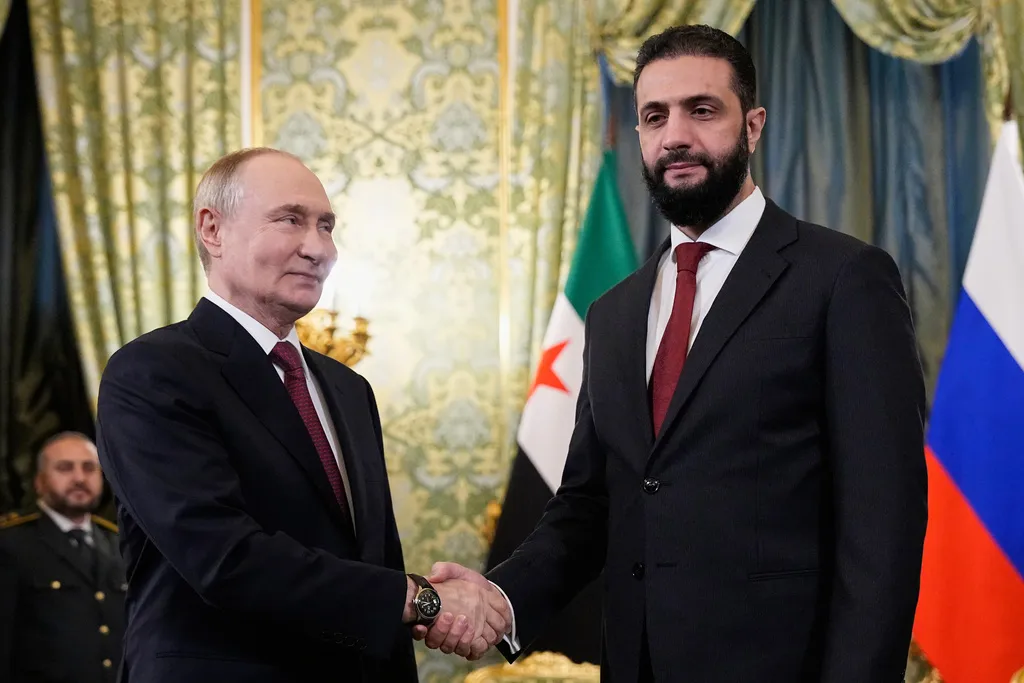Syrian President Ahmed al Sharaa touched down Wednesday in Moscow, the same city in which the dictator he overthrew now lives in protected luxury.
Sharaa was in Russia to meet with President Vladimir Putin — the first bilateral meeting between the world leaders since the Syrian president overthrew Bashar al-Assad last year in a violent insurrection.
The Syrian leader, a former Islamic terrorist who has embraced business suits and liberal democracy after taking the reins of a fractured country, played nice with Putin as he emphasized his nation’s desire to reestablish and “redefine” ties with the Eastern European power.
“We are trying to restore and redefine in a new way the nature of these relations so there is independence for Syria, sovereign Syria, and also its territorial unity and integrity and its security stability,” Sharaa told Putin during a press conference.

“There are bilateral relations and shared interests that bind us with Russia, and we respect all agreements made with it,” he continued.
Putin offered his own affirmations of the two nations’ alliance, reminding the public that Russia has fiercely supported Syria since 1944, when the Soviet Union was a rising power.
“During this time, relations between Syria and Russia have always been exclusively friendly,” Putin said Wednesday. “We in Russia have never had any relations with Syria that were tied to our political circumstances or special interests.”
He added, “Throughout these decades, we have always been guided by one thing: the interests of the Syrian people.”
Still, the unseen figure of Assad haunted the occasion remotely from the Moscow apartment furnished to him by the Kremlin after his overthrow.
Syrian officials told news wires such as Reuters and Agence France-Presse that Sharaa would use the state visit as an opportunity to request that Assad be handed over.
That demand was not made publicly, and if Sharaa made the ask behind closed doors, Putin is unlikely to honor it.
The Russian president has amassed an impressive collection of former world leaders over the course of his career and seems to enjoy the political capital gained by protecting a rogues’ gallery of deposed heads of state.
Former Ukrainian President Viktor Yanukovych, a Russian asset who was ousted from power in 2014, fled to Moscow and was granted protection.
A 2017 investigation by anti-Kremlin Russian outlet Meduza claimed to track Yanukovych to a sprawling compound in Bakovka owned by the Interior Ministry. Surrounded by immense brick walls and thick forest, the former world leader’s purported accommodations appear generous if rather severe.
President Askar Akayev, the first leader of modern Kyrgyzstan, was similarly invited to start over in Russia after protesters stormed his residence in 2005 and chased him out of the country. He has since been living a more subdued life, working as a professor at Moscow State University.
Assad is joined in Moscow by his wife, Asma Assad, once dubbed the “Rose in the Desert” by Vogue magazine in a poorly aged profile. Their two sons and one daughter are believed to be living with them.
Not much is known about the life of the Assad family as they live out their post-dictatorial lives in Moscow. They are believed to be worth over $1 billion, independent of aid given to them by the Russian government.
SYRIAN PRESIDENT GETS STAR TREATMENT AT UN AS COUNTRY IS WELCOMED BACK AFTER YEARS ON THE OUTSKIRTS
Assad reportedly requested that Russia back efforts to establish an independent statelet along Syria’s coast following his overthrow, dedicated to providing refuge for Alawites — a minority sect of Islam to which the former dictator belongs.
The Kremlin shot down this proposal, seeking to keep the country intact and avoid unnecessary geopolitical divisions that could upset the delicate balance of power in the Middle East.
